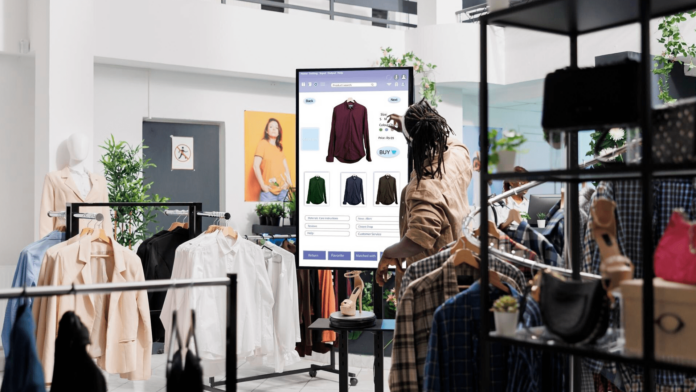The fashion and retail industry has been facing a series of formidable challenges, from the intricacies of supply chain management to rising production costs, and evolving consumer behaviours. Brands and retailers in the industry are rethinking how they can stay competitive and win over customers. Could artificial intelligence (AI) hold the key to unlocking new opportunities and possibilities?
As AI ripples through various sectors, the fashion and retail industry is taking notice of its impact. AI is emerging as a pivotal tool for enhancing business productivity and freeing up valuable time for creative pursuits. It is proving to be a catalyst for operational efficiency and customer experience enhancement.
AI is undoubtedly a lever that opens the door to growth and commercial prospects for businesses in the retail and fashion sectors. Its potential applications are myriad, offering unique benefits. Let’s explore some of these use cases, featuring innovative startups and their products alongside each use case.
Addressing e-commerce returns
With the growing prevalence of e-commerce in the fashion industry, finding the right size and style remains a challenge for consumers. Fit issues are a major cause of e-commerce returns, with research from Whistl, a UK-based logistics company, indicating that 70% of shoppers have returned online purchases because of sizing problems. AI offers promising solutions to this prevalent issue, including generative AI models that can simulate clothing fits and AI-driven tools for size recommendations and fitting advice.
Amsterdam-based Lalaland.ai is advancing in the fashion industry with its generative AI technology, which creates lifelike, diverse models, promoting inclusivity for brands. Their technology aids brands in boosting wholesale performance and reducing time to market, leading to a more efficient and sustainable design process. Lalaland.ai collaborates with high-profile fashion brands such as Levi Strauss & Co., Calvin Klein, and Tommy Hilfiger. However, the use of generative AI models is not without controversy, eliciting mixed reactions regarding consumer and industry perceptions. Concerns include the potential displacement of human models and the implications for the fair payment of models representing diverse backgrounds.
Generative AI is revolutionizing the online shopping experience by enabling virtual try-ons. Paris-based company Veesual allows consumers to use virtual fitting rooms to select models and outfits, enhancing the digital shopping experience. They partner with French fashion brands such as La Redoute, Jules, and Gemo, integrating their technology to offer a more interactive shopping interface. Meanwhile, advancements in smartphone technology have made 3D body measurements widely accessible, with computer vision and AI working together to generate personalized size profiles. Oxford-based B2B startup Aistetic has developed a platform that uses 3D body scans to provide precise measurements, aiming to decrease return rates and promote sustainable practices in fashion.
Optimising inventory and supply chain management
Trend forecasting has undergone significant evolution in recent decades, with trend cycles accelerating due to social media influence. This has shifted trend-setting influences from traditional runway shows and buying teams to more dynamic sources. AI is becoming essential for brands and retailers in adapting to rapid changes in trends and consumer behaviour.
Paris-based Heuritech offers a demand forecasting solution that enables brands and retailers to enhance sell-through rates and adopt sustainable production methods. By analysing market and consumer data, their platform uses AI to convert social media trends into actionable insights, enabling more accurate trend predictions. Heuritech collaborates with prestigious brands including Dior, Louis Vuitton, and Paco Rabanne. Similarly, Manchester-based Sparkbox.ai provides an AI-driven retail planning and optimisation platform to assist merchandisers, with clients like River Island and Matchesfashion. Its platform includes features for price optimisation, demand forecasting, and inventory management.
Hyran Technologies addresses supply chain inefficiencies starting at the production phase, offering an AI-powered collaborative platform for production. Their solution connects brands with supply chain partners to streamline sourcing strategies, reduce waste, and expedite the production of in-demand fashion items.
Personalised recommendations
Fashion is intrinsically personal, serving as a medium for individuals to express their identity and personality through their attire. Many spend hours meticulously curating their outfits and wardrobes. AI is revolutionising the fashion and retail industry by offering personalised shopping experiences and bespoke product recommendations, which can significantly enhance customer satisfaction and boost sales.
The key to powering such customised recommendations is acquiring the right data. Firms like Intelistyle and Syte are at the forefront, tagging products in brand and retailer inventories with AI-generated metadata to enable finely-tuned recommendations and hyper-relevant product searches. On the other hand, Oxford-based Sociate AI claims their AI-powered recommender systems do not require data labelling for setup, offering enhanced search functionality for e-commerce sites with their conversational AI that merges fashion intelligence with personalisation.
Moreover, consumers are increasingly utilising various mediums for fashion recommendations, extending beyond brand and retailer websites. A novel avenue is through wardrobe management apps—consumer-facing mobile applications that allow users to catalogue their wardrobes and receive styling advice, usually powered by AI. There has been a surge in such apps that assist consumers in leveraging their existing wardrobes more effectively. Notably, London-based Save Your Wardrobe, which was honoured with the 2023 LVMH Innovation Award, employs AI to digitise wardrobes and suggests ways to prolong the life of clothing, providing services like alterations, eco-cleaning, and upcycling.




